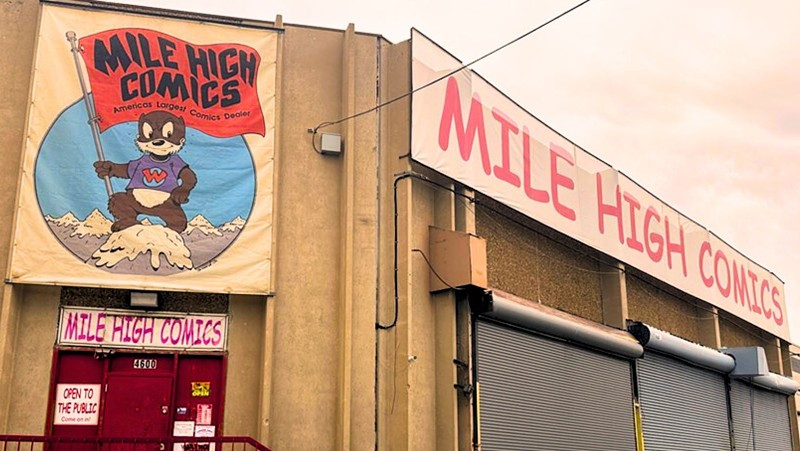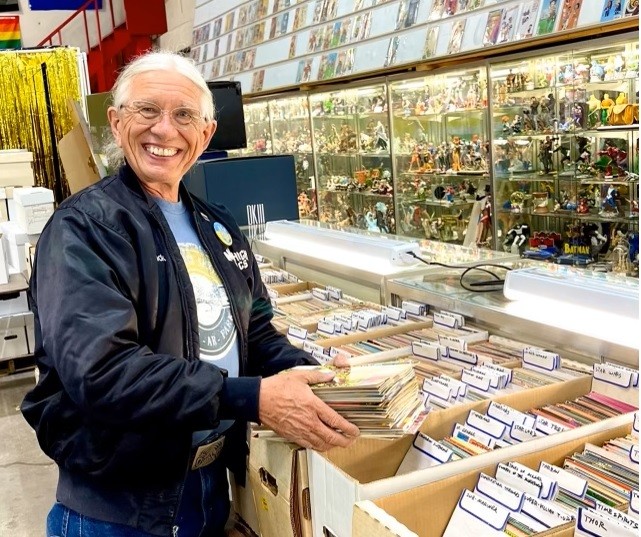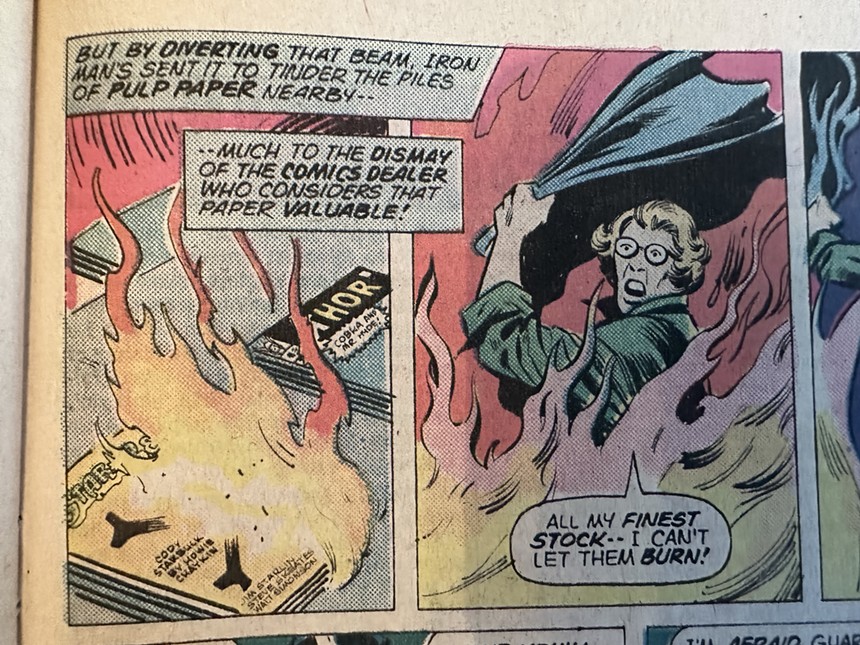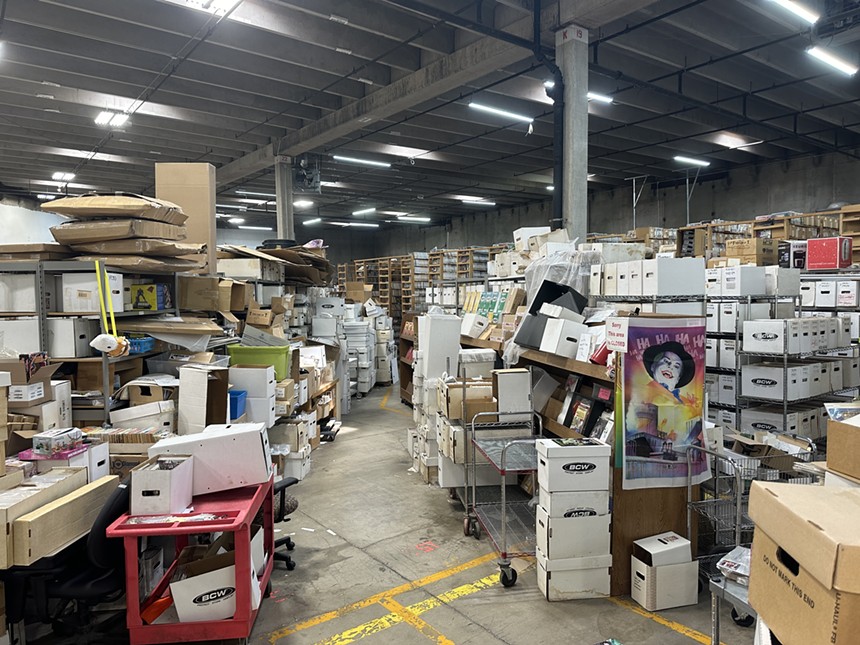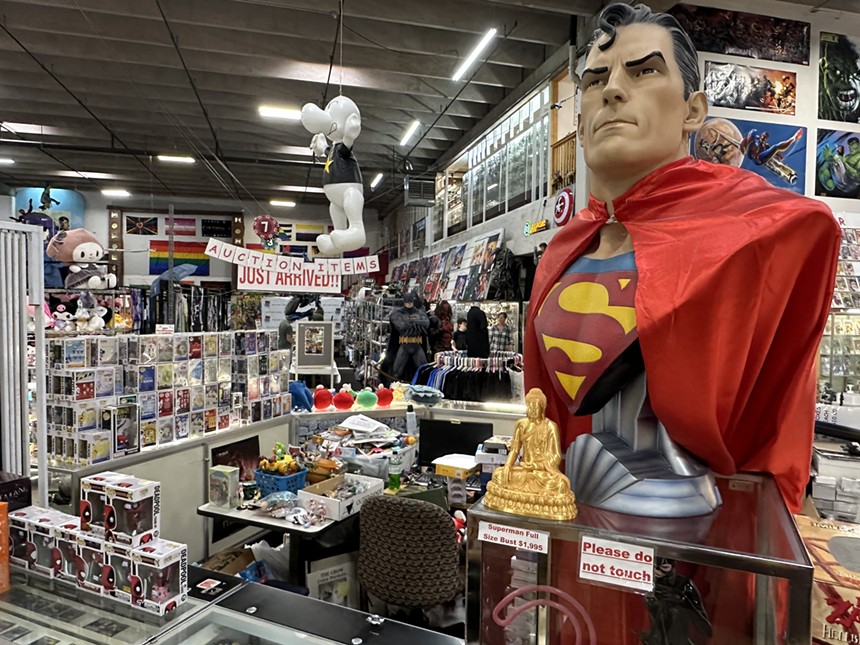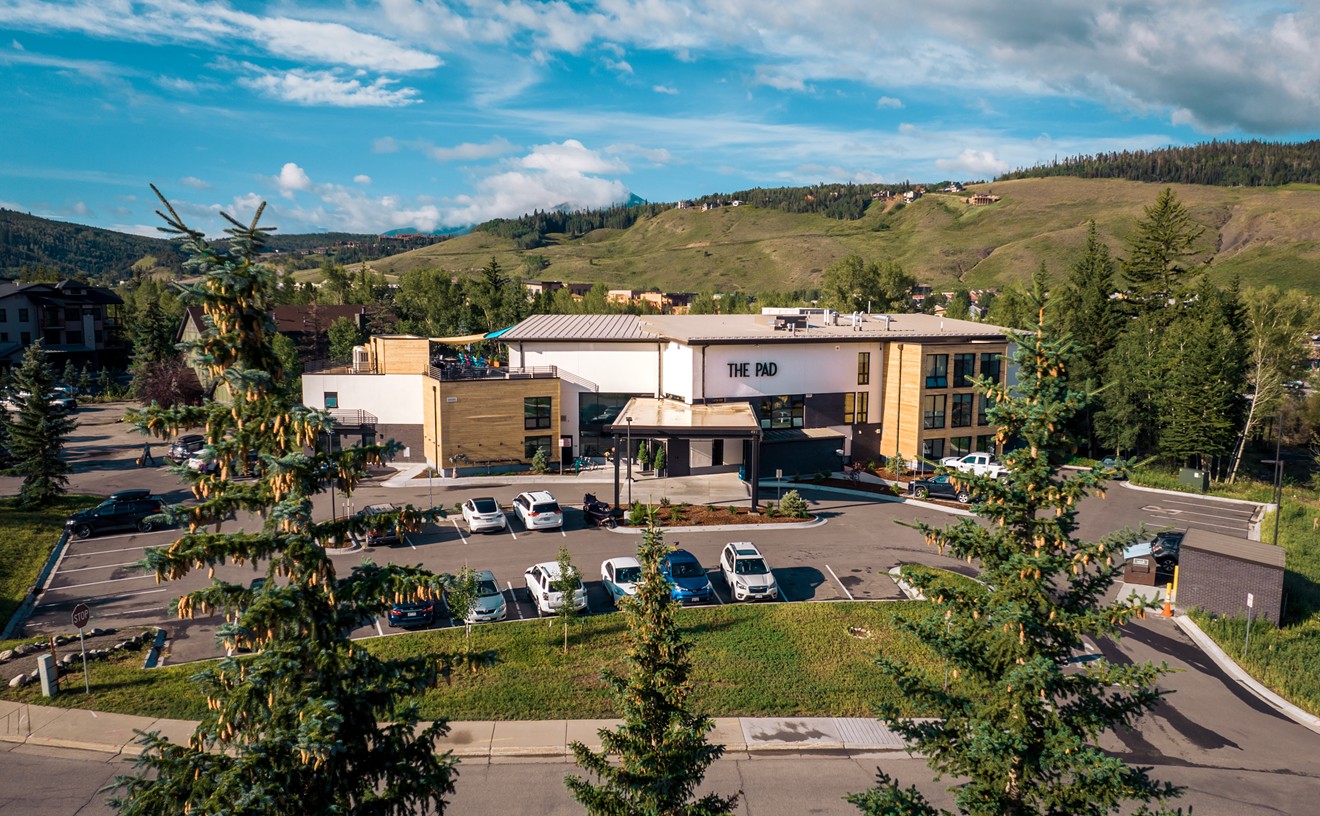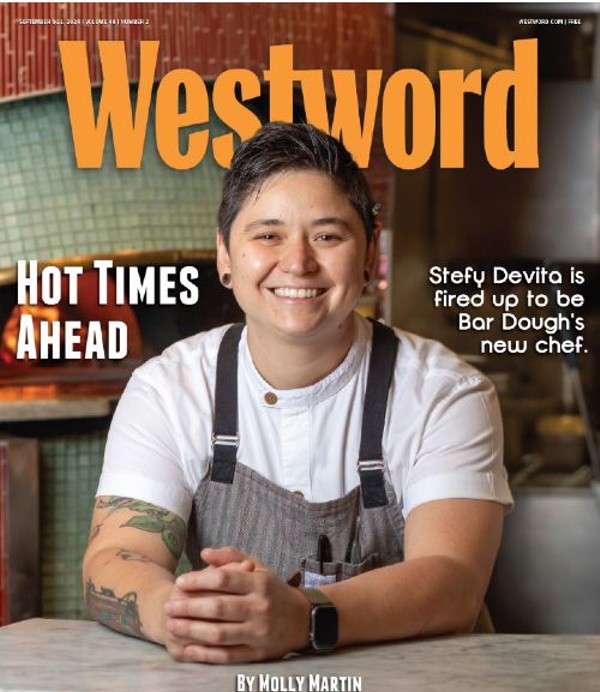Mile High Comics, which marks a half-century in business this month, is a true phenomenon — and not just to the Rocky Mountain region it primarily serves. Even if only comic-book fans know it, Mile High is a national brand.
I grew up in downstate Illinois. In 1980, I was eleven years old and loved reading comics. I wasn't really a collector yet, but my reading (and re-reading) pile was getting pretty tall. Like most comic book fans of that era, I didn't bag or board anything. I'd sometimes (shudder) fold a comic in half and put it in my back pocket to ride my banana-seat bike to a park and read it there. My friends and I would trade them — not for value, but just because we hadn't read that one yet. And because Mile High Comics ran ads in every comic Marvel released in the early ’80s, we all knew about the wonderland that existed out west, a glorious place where comics abounded.
"Those ads just about ruined me," laughs Chuck Rozanski, the owner and founder of Mile High. "The first time I ran those ads, I got $108,000 in orders in the initial ninety days. Our average price back then for a comic was about a dollar. I didn't have the staff to fill the orders. In some cases, I didn't even have the comics to fill the orders. I lucked out because Colorado Comics, which used to be at the corner of Lincoln and Colfax, was forced to close because RTD wanted to build a giant station there and took the whole block. I ended up buying up about half a million of their books."
That purchase, along with a few others around that same time, helped Rozanski fill his back orders and solve the admittedly nice problem of enjoying more requests than he could handle. He was able to catch up, and the profits allowed Mile High to keep advertising — and selling worldwide. Even though the ads only ran for a few years, he says they're still working for him: "People still come in from all over and say they know Mile High from those advertisements. We're a stop on family road trips. Isn't that something?"
Rozanski always had a bit of a Midas touch, he admits, when it came to creating the retail juggernaut of funny books. However, he "didn't come from money," he says. "Quite the opposite." He got his start hitchhiking to conventions as a teen and buying and reselling comics for some small profit — just enough to buy more and still afford food (and even then, he says, most of his groceries were from the "scratch and dent" section of the supermarket).
By 1974, Rozanski had tired of both college at the University of Colorado in Boulder and the ROTC, which was helping him pay for it. He hit the road again, and this time, his mother, who was leaving for Germany to convalesce after some mental health issues, insisted he take her 1963 Chevy.
He packed the comics he had to sell or trade in waxed-cardboard boxes from fryer chickens, which were the perfect width to hold two rows of comics. "They were great," he says, "once you carefully cleaned off the residual chicken fat — and even then, I had to use baby powder to keep down the smell." But they had handles and were free and available at the loading dock of most grocers. Rozanski recalls sleeping on the boxes in the back of the Chevy while on the road.
The 1974 San Diego Comic Con marked the first time he ever made real money from comics. He was offered a deal by Denver comics dealers Jim Allen and Dennis Wakabayashi, of Middle Earth Publishers, to sell their Barry Smith portfolios of Conan illustrations for $10, and Rozanski could keep $4. Back then, the San Diego event was only a fraction of what it would become, but it was enough that he netted some $2,500 in profit after expenses — an effort reflected in Marvel's Iron Man #72, which portrayed a comics seller so committed to his retail sales that he refused to leave the dealers' room despite a fiery conflagration caused by the battle between Iron Man and the dastardly Melter.
Rozanski wanted to open his own shop when he returned to Boulder, but was despondent to learn that Lois Newmann had already opened one downtown. "Boulder was only about 70,000 people back then," Rozanski recalls, "so there was only room for one comic shop. Lois's store was advertised as specializing in science fiction, fantasy...and comics."
But when Rozanski visited the store, he found just one single spinner rack tucked in the back. He asked Newmann if he could sell some of his books in her store on consignment, and she agreed, offering him a single shelf. When Rozanski said he'd need more room than that, Newmann invited him into the back room of her store.
What he saw there would become the first Mile High Comics store.
At first sight, it was a cavernous mess, with a single bare lightbulb on a pull-chain in the center of a room far too large for it to light. The floor was unsealed concrete under thick layers of dust. Rozanski says he "pulled two all-nighters" to clean it up and apply several coats of sealer. He dumpster-dove for lathing strips from nearby demolition sites to use as his first comic displays. He bought a secondhand counter from a store going out of business, and twenty card tables from a Denver comic owner for $2 each. For table covers, he dyed white sheets red (though they turned out pink) in his apartment bathtub. "I don't know if they ever got the red out of that tub," he laughs.
Nine days after striking the deal with Newmann, on September 30, 1974, Mile High Comics opened for business, with thirty fryer-chicken boxes of comics. Rozanski was only nineteen years old.
The store got by, but "just barely," he says. He expanded with more pop-culture swag: posters, buttons, T-shirts, bumper stickers, used Playboys and LPs and underground comics. He also befriended Emil Clausen, a wholesaler who ran periodical distribution channels in the Boulder region. Through Clausen, Rozanski got a 40 percent discount on the retail price of comics, and received them upwards of a week before the large retailers would. "It made a huge difference," he says. "I had comics fans from all over coming to my store because we had what they wanted so much earlier. I owe a lot of people a lot of credit for my success, but Emil is probably first among them."
Still, the thing that really kept the Mile High doors open were the back-issue sales, even from the start.
"I made a few bonehead moves that turned out to work okay in the end anyway," Rozanski remembers. On the urging of an employee who wanted to run a satellite store, Mile High opened its second location in Fort Collins in 1975. "It was a terrible idea," he says. "Fort Collins back then was basically two main streets, and we opened up on the wrong one. No foot traffic at all. And then my employee that convinced me to do it so he could run it, well, he ran off to California after only three months. It very nearly put me out of business."
But as luck would have it, instead of closing that second store, Rozanski found an opportunity to open a third.
Jim Allen from Middle Earth Publishing had died unexpectedly, leaving his former partner to head up two comics stores for which he had very little interest anymore. Wakabayashi sold the company's entire stock to Rozanski for $3,000 — including investments in stacks of copies of work by up-and-coming artists now considered masters of the form: Bernie Wrightson, Mike Kaluta, Jeff Jones and Barry Smith. The only hitch in the deal: Rozanski had to take the store on East Colfax, too. And so the third Mile High was born.
"I don't know it for sure," Rozanski says, "but I think the idea of me suddenly owning three stores in three different cities might have played a part in me getting the opportunity to buy the Edgar Church collection. Despite the fact that two weren't doing very well, it still lent me some credibility."
The Edgar Church collection put Mile High Comics on the map. Church, an artist employed by a phone company, had amassed an estimated 20,000-plus comic books in his northwest Denver home. Upon his passing, the family contacted comics shops to gauge their interest, with Rozanski ultimately receiving the bounty. It is known now as the most valuable comics collection ever to surface — including what's thought to be the highest-graded copy of Action Comics #1. Most of all, it offered Rozanski the capital and the back-issue stock to become the major player he's become.
Over the years, different Mile High stores have opened and closed. Eventually, they all combined to form the Mile High Mega Store on Jason Street in Denver, which opened for retail in 2012...just a few miles from the small Highland home where the Edgar Church collection was discovered.
"It's been an amazing ride," Rozanski concludes. "When I see kids come into the store, I make a point of going up to them and saying 'Hi, I'm Chuck, and this is my store, and you know what? I built this store for you.' And the look on their faces...that's the joy of comics, you know? I want them to remember the day they entered this wonderful place, the largest comic book store in the world. These are the memories. These are the things I want kids to remember."
Mile High Comics is open daily at 4600 Jason Street, and always has a full schedule of comic book and charity events. For more information, see the Mile High Comics website.

Audio By Carbonatix
[
{
"name": "Air - MediumRectangle - Inline Content - Mobile Display Size",
"component": "12017618",
"insertPoint": "2",
"requiredCountToDisplay": "2",
"watchElement": ".fdn-content-body",
"astAdList": [
{
"adType": "rectangle",
"displayTargets": "mobile"
}
]
},{
"name": "Editor Picks",
"component": "17242653",
"insertPoint": "4",
"requiredCountToDisplay": "1",
"watchElement": ".fdn-content-body",
"astAdList": [
{
"adType": "rectangle",
"displayTargets": "desktop|tablet"
},{
"adType": "rectangle",
"displayTargets": "desktop|tablet|mobile"
}
]
},{
"name": "Inline Links",
"component": "18838239",
"insertPoint": "8th",
"startingPoint": 8,
"requiredCountToDisplay": "7",
"maxInsertions": 25
},{
"name": "Air - MediumRectangle - Combo - Inline Content",
"component": "17261320",
"insertPoint": "8th",
"startingPoint": 8,
"requiredCountToDisplay": "7",
"maxInsertions": 25,
"watchElement": ".fdn-content-body",
"astAdList": [
{
"adType": "rectangle",
"displayTargets": "desktop|tablet"
},{
"adType": "rectangle",
"displayTargets": "desktop|tablet|mobile"
}
]
},{
"name": "Inline Links",
"component": "18838239",
"insertPoint": "8th",
"startingPoint": 12,
"requiredCountToDisplay": "11",
"maxInsertions": 25
},{
"name": "Air - Leaderboard Tower - Combo - Inline Content",
"component": "17261321",
"insertPoint": "8th",
"startingPoint": 12,
"requiredCountToDisplay": "11",
"maxInsertions": 25,
"watchElement": ".fdn-content-body",
"astAdList": [
{
"adType": "leaderboardInlineContent",
"displayTargets": "desktop|tablet"
},{
"adType": "tower",
"displayTargets": "mobile"
}
]
}
]

